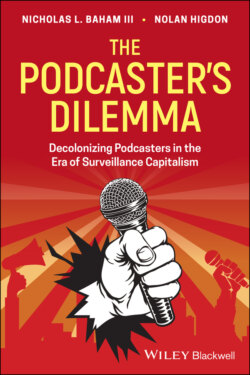Читать книгу The Podcaster's Dilemma - Nolan Higdon - Страница 10
Methodology
ОглавлениеTo understand how podcasters were using their programs as spaces of decolonization, we randomly surveyed over one hundred podcasts that were identified through word searches in major podcasting websites such as Apple Podcasts and Spotify. We looked for podcasts that used concepts, themes, and language identified in the scholarship on decolonization. We then surveyed a sample of programs from each podcast and coded them to determine how, if at all, they engaged in the processes of interrogation and critique, counter-narrative, and action. We listened to a handful of their programs and read their descriptions, their host bios, and their listener comments. In addition, we had our interns help develop profiles for the podcast hosts so we could better determine who was behind the approaches to decolonization in the podcasting space.
We analyzed the content through a critical lens. Critical theory posits that dominant ideologies result from power inequities that are strengthened and fortified through media and communication.51 Critical scholars contend that identities – such as class, race, gender, sexuality, and ability – are an expression of power because they are primarily shaped according to dominant structures that maintain power imbalances. In fact isms such as sexism or racism are often incorrectly attributed to individual behavior rather than to the systemic forces that solidify power relations by reinforcing colonial mentalities.52 We used a critical lens because we are critical scholars and power is the defining feature of colonization. As a result, power makes for a useful lens in deciphering the dynamics of colonization in the podcasting space.
In order to help frame the narrative of podcasting as a space of decolonization, we fundamentally build on Frantz Fanon’s analysis of the decolonizing potential of radio communication in A Dying Colonialism (1965), a groundbreaking study of the methods employed by the Algerian resistance (FLN) in its armed struggle against French colonialism. We find that the appropriation of digital broadcasting technologies by marginalized groups engaged in decolonization is analogous to the appropriation of radio technology in 1954 in Algeria and in other significant decolonizing revolutionary movements from the post-World War II era to the present. Indeed, since Fanon’s work, a host of studies have examined radio as a tool for decolonization.53 Fanon’s work helps contextualize the revolutionary potential of podcasting.
